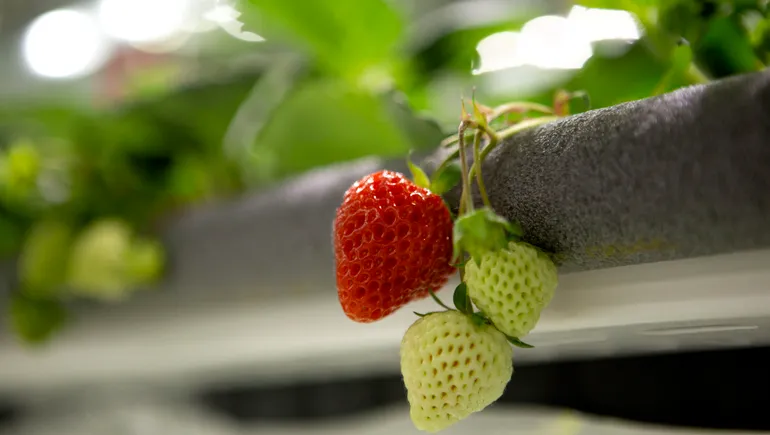Vertical strawberry grower Oishii clinches $134M amid indoor farming woes

Indoor strawberry grower Oishii closed a $134 million funding round on Wednesday, allowing the company to break into new markets despite challenges facing the once-hot vertical farming sector.
New Jersey-based Oishii, which calls itself “the world’s largest indoor vertical strawberry farm,” has now raised $189 million since its founding in 2016. The brand plans to use funding to open a solar-powered facility, expand distribution and invest in advanced robotics.
“This capital will help us pave the way for mainstream adoption of vertical farming in the U.S.,” Hiroki Koga, CEO and co-founder of Oishii, said in the press release.
Indoor farming companies have struggled over the past year. Economic pressures dented investor support. Businesses filed for bankruptcy and suffered staff turnover in the highest ranks. But Oishii leadership says that the company’s business model differentiates it from other indoor farms, which has spurred growth.
Customers know they can expect something different from Oishii and the company emphasizes brand building, Koga said in an email interview with Agriculture Dive. While indoor farmers commonly grow leafy greens, Oishii is the only vertical farm in the U.S. that sells strawberries year round.
Along with its strawberry variations — the Omakase Berry and the Koyo Berry — the company also grows snack-sized Rubī Tomato. The company said it plans to unveil an additional berry type this year.
Beyond its differentiated product, Oishii has also eschewed the idea of scaling for the sake of getting bigger, Koga said, allowing the company to focus its tech investments. Oishii uses AI to direct its indoor bee population, environmental controls and farm output. The firm also deploys harvesting robots from manufacturer Yaskawa, which is an investor.
“By focusing on investing further in our engineering talent and tech, we are able to deliver a strong pathway to profitability through innovation,” he said. “For example, we are the only indoor vertical farm company in the U.S. to pollinate our produce with bees and produce at scale – a feat that was previously thought to be impossible.”
Leadership experience and the company’s roots in Japan have also helped refine Oishii’s business model. Japan has remained a leader in vertical farming since the early 2000s and the C-suite has more than 30 years of combined experience in the sector, Koga said.
“We used these learnings to avoid the major pitfalls that others in the industry are grappling with,” Koga said. “For example, we knew companies that are focused on low margin leafy greens would struggle with commercial viability.”
Recently, Oishii embarked on an expansion across the U.S. Northeast. Last June, the company brought the Koyo Berry to Washington, D.C., as well as Maryland, Massachusetts and Connecticut, with distribution at Whole Foods Market, Fresh Direct and multiple specialty grocers.
Source: fooddive.com

